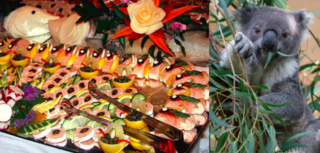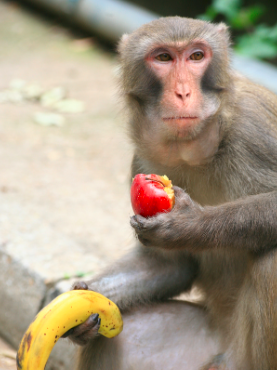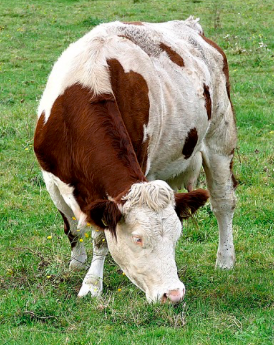Diet
The ABCs of Vitamin Deficiency: A Uniquely Human Story
Why do humans have such a needy diet? The answer lies in our deep past.
Posted September 4, 2018
It's a truth we learn as young children in discussions about food groups, the food pyramid, a "balanced diet," and so forth: Humans need to eat a wide variety of food in order to be healthy. A little bit of this, a little bit of that, not too much of X, and don't forget Y. Broccoli is great for magnesium and several vitamins; bananas give us potassium; carrots are a good source of vitamin A; we need some meat or nuts for protein; Eggs are important for vitamin D; gotta get that calcium from dairy, and so on. It's no wonder that so many of us just give up on achieving the right balance in our diet and instead pop supplements (few of which live up to their labels).

We're so accustomed to the neediness of our diet that it rarely registers just how strange this is compared to other species. Our companion animals eat a very simple diet day in and day out and yet they do not suffer malnutrition for it. If we tried to subsist solely on lamb and rice, like many dogs do, we would eventually succumb to one of several possible deficiencies of vitamins and minerals. The koala can be perfectly healthy living purely on eucalyptus leaves, which are not very nutritious by our standards.
What gives? Why do we have such demanding dietary needs? Is there something seriously wrong with our relationship to food? The short answer is probably yes. As I have found myself saying a lot lately, humans are a pretty flawed species. We have an incredible number of quirks and glitches that defy simple logic and thus call out for explanation. While that may seem depressing, it's actually pretty uplifting because many of these flaws do have explanations that are deeply informative about our past, a past in which we have persevered against all odds. Our needy diet is a perfect example.

Take vitamin C, for example. As I've written before, the dietary requirement for vitamin C (ascorbic acid) is actually an oddity. The vast majority of animals make this micronutrient for themselves right in their liver. Unfortunately, an ancestor of all primates lost this ability many millions of years ago and primates have been dependent on dietary vitamin C ever since. This has restricted primates to climates where vitamin C is readily obtainable and has rendered them sensitive to scurvy. With few exceptions, non-primates have no fear of scurvy.
Our need for vitamin D is also strange. As I explain for Discover Magazine, vitamin D is mainly needed for calcium homeostasis in our bodies and thus strong bones. We cannot absorb and retain calcium unless we have enough vitamin D. This may be poor design right off the bat because it means there are two ways to become calcium deficient, either not getting enough calcium or not getting enough vitamin D. But the oddity of vitamin D biology is much deeper than that.
Yes, we can synthesize vitamin D totally on our own, but it involves three steps in three different tissues and also requires activation by sunlight in our skin. The need for sunlight puts us at risk for both skin cancer and folate deficiency. (Because sunlight destroys folate in our skin, too much of it zaps our body of this important nutrient, which is especially problematic for pregnant women.) So the story of our need for vitamin D is a lethal tug-of-war between skin cancer and folate deficiency on one side and rickets or osteoporosis on the other. This is an almost purely human problem which explains the widespread deficiency in vitamin D, even in the developed world. (Read my article for a more detailed explanation why other mammals don't have this problem.)
Next stop, vitamin B12. This is another really strange one. Most vegans are familiar with B12 because it is the one micronutrient that we simply cannot get from any plant sources. Only animal products provide vitamin B12 so vegans must supplement. B12 plays a role in some of our most basic biochemical reactions such as the synthesis of amino acids and fatty acids, which are the building blocks of proteins and lipids, respectively. This begs the question: If B12 is so important—but only animal products provide it—how do the many herbivore animals survive?

This is where it gets really weird. It turns out that herbivore animals harbor bacteria in their intestines that make vitamin B12 for them. All they have to do is absorb it. So why don't we have those same bacteria? We do! So why don't they make vitamin B12 for us? They do! But these helpful bacteria are in our large intestines and for some reason, we can only absorb vitamin B12 in our small intestine. This is why we still need to get it in our diet, even though we have plenty of it already in our guts. (I muse about the possible reasons for this in this article.)
Vitamins C, D, and B12 are just three micronutrients that humans, for some reason, have a tougher time getting than most other animals, but they do not stand alone. We scramble to get enough of some minerals as well, such as iron, calcium, and iodine. It seems to me that there are so many separate nutrients that we struggle to get enough of that there must be some kind of larger explanation. In my book, I describe one possible explanation, summarized below.
If we trace the last 10-15 million years of human evolution, for nearly all of that time, our ancestors were living in sub-Saharan Africa, in either the lush rainforests or the nearby bountiful grasslands. This environment teems with a wide variety of nutritious food. Without going into all the details of our transition from vegetarians to omnivorous scavengers to successful hunters (though not strict carnivores), our history is marked by our efforts to find and make use of diverse food sources. Along the way, we seem to have lost our ability to make certain nutrients for ourselves.
Although Jean-Baptise Lamarck's theory of use and disuse has been mostly rejected as a mechanism for evolution, the general principle was not far off the mark. It is a general trend that body parts that are no longer critical for success eventually go away. It is not from the disuse itself, as Lamarck imagined, but because the constant onslaught of random mutation (and subsequent genetic drift) leads to the degradation of everything that is not maintained through natural selection.
If we apply this principle to our diet, the corollary goes something like this: If a given animal lineage is constantly provided with a certain micronutrient in their diet, they may eventually lose the ability to manufacture that micronutrient for themselves. That's an oversimplification, but you get the point. Our ancestors stopped making vitamin C because they suffered a mutation in their GULO gene. This was tolerated because they already had vitamin C in their diet. Our ancestors stopped absorbing bacteria-produced vitamin B12 in their large intestine, because scavenging was providing dietary B12 in their small intestine. And so on.
Prior to the dawn of agriculture 10 to 15 thousand years ago, the dietary insufficiencies we now suffer with might never have been an issue. However, farming brought a narrowing of our diet to a few main foods and heavy reliance on just one or two staples. Worse, those staples are rich with carbs but poor in most of the micronutrients we need. Yes, agriculture allowed us to "feed the masses," but not necessarily with the kind of food that we really need. While hunter-gather tribes often face starvation and undernourishment, they do not seem plagued by many of the vitamin deficiencies we now contend with.
It's been long known that modern diets do not at all resemble that of our mesolithic ancestors, not to mention our paleolithic ones. This has led to a number of obstacles to healthy eating habits; deficiencies of certain micronutrients is just one of them. Given how completely dependent we are on the various starchy staples that form the base of cuisines worldwide, there is no easy fix for this. Unless you're up for gnawing on tough roots, tiny fleshy fruits, bitter leaves, slimy worms, and the occasional plate of cold bone marrow (usually raw, of course), a return to the true "paleo" diet isn't really an option.
References
Lents, NH. (2018) Human Errors: A Panorama of Our Glitches, from Pointless Bones to Broken Genes. New York: Houghton Mifflin Harcourt.




